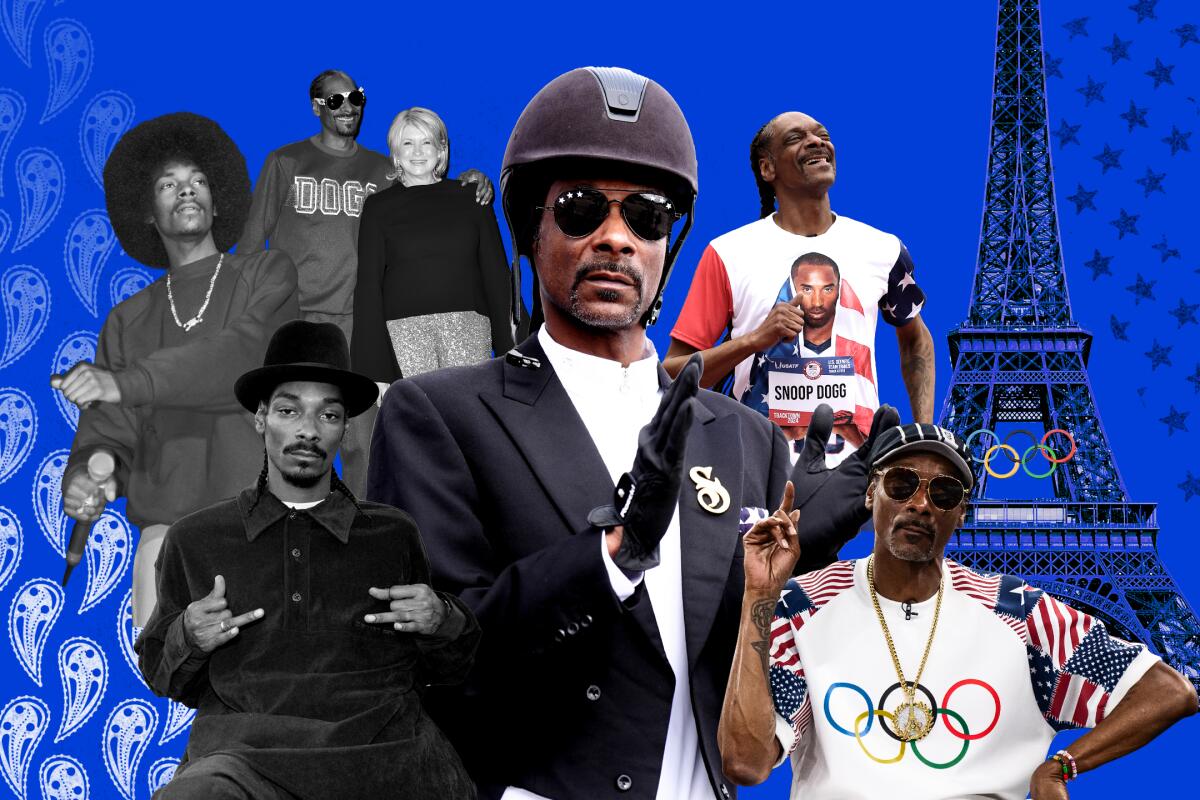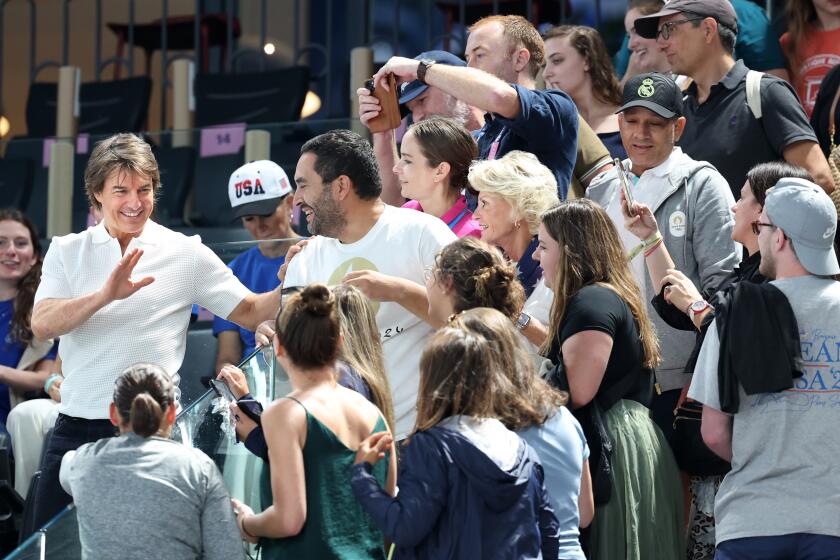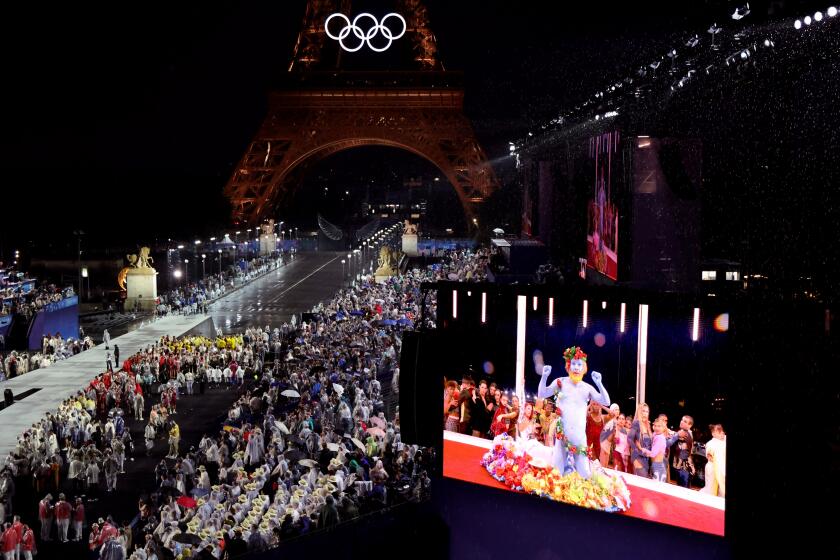How Snoop Dogg became America’s sweetheart at the Paris Olympics

- Share via
Making waves in a pool with Olympic swimming legend Michael Phelps. Rolling with LeBron James and the U.S. men’s basketball team. Trading dance moves with gymnast Simone Biles and her teammates. Throwing some side eye at the Mona Lisa inside the Louvre.
Snoop la la!!!
Biles and U.S. swimmer Katie Ledecky may have been crowned athletic GOATs at the Summer Games, but they‘re sharing the spotlight with the D-O-Double-G as Snoopmania sweeps through Paris.
Snoop Dogg, who began his career as one of the most prominent gangsta rappers of the West Coast hip-hop scene, has emerged as an MVP of NBC’s Olympics coverage this year, helping the network strike gold with record ratings. Since carrying the torch in the opening ceremony, the lanky, molasses-smooth artist has been an ubiquitous presence, balancing his role as a special correspondent for NBC with leading the cheers at numerous events, including fencing, judo and badminton.
His swagger into Saturday’s equestrian competition in head-to-toe elite horseman gear — including a dressage tailcoat — was an instant headline-grabber. His taped segments with top athletes have highlighted the network’s prime-time recaps. An Olympic pin depicting him exhaling the multicolored Olympic ring logo in front of the Eiffel Tower — parodying his love of weed — is such a hot item that even he reportedly can’t get his hands on one.
“It’s all about peace, love, sports and unity,” he said in a TikTok video in describing his excitement over being at the Games.
While the rapper has long been a familiar fixture in pop culture, whether on the sidelines of major sporting events, in film (“Training Day,” “The Garfield Movie”) and TV (MTV’s “Doggy Fizzle Television”), as a product pitchman (Corona beer, Tostitos), talent show coach (“The Voice”), game show host (“The Joker’s Wild”), guest artist (“California Gurls” with Katy Perry) and Martha Stewart bestie, the Snoopla at the Olympics has firmly secured his standing as a crossover superstar with wide demographic appeal.
The Summer Games in Paris have been a star-studded affair. But for The Times’ most avid Olympic watchers, NBC’s focus on celebrities has been largely an annoying distraction.
But seeing him dining in a sophisticated Paris restaurant with Stewart, bantering with U.S. volleyball duo Sara Hughes and Kelly Cheng and grooving with Biles may cause whiplash for longtime Snoop observers, who still remember the hardcore gangsta rapper who once boasted in verse about killing police officers (“187 on an undercover cop”), regularly used his tracks to call women “b—,” “hos” and “tricks,” and dabbled in soft-core pornography with his “Snoop Dogg’s Buckwild Bus Tour.”
His 2004 hit album “R&G (Rhythm & Gangsta): The Masterpiece,” which is being reissued this month to celebrate its 20th anniversary, includes the song “Can U Control Yo Hoe?,” which contains the lyric: “You got to put that b— in her place / Even if it’s slappin’ her in her face / You got to control yo hoe.”
That album’s smash hit, “Drop It Like It’s Hot,” features violent imagery laid against an irresistible earworm beat: “If you play me close, you’re on a red beam / Oh you got a gun so you want to pop back? / AK-47 now n— stop that / Cement shoes, now I’m on the move / Your family’s crying, now you on the news / They can’t find you and now they miss you / Must I remind you I’m only here to twist you / Pistol-whip you, dip you then flip you...”
In a Times interview about the album and other projects, Snoop himself said it “represents Snoop and what he stands for, musically, physically, mentally and spiritually, where he’s been and where he’s going.”
Which makes his transformation into America’s sweetheart at the Paris Olympics all the more fascinating: How did Snoop, born Calvin Broadus, remake himself as a cultural figure palatable to a broadcast network during its most high-stakes telecast?
For one thing, the rapper — who, though never denying or apologizing for his past remarks, has avoided the backlash that has struck the likes of Jo Koy, Andrew Dice Clay and Don Lemon — began the process of softening his edge long before arriving on the banks of the Seine.
Snoop is a longtime youth football coach who once awarded each player on the victorious Rowland Heights Raiders team on which two of his sons played with a brand new WRFF bike, and his consistent dedication to youth sports has made him a snug fit for NBC’s ultra-positive Olympics brand. In 2005, he founded the nonprofit Snoop Youth Football League to help inner-city kids. The program has assisted more than 60,000 young people, according to its website.
The entertainer has called his 1996 acquittal on first- and second-degree murder charges in the shooting death of a Los Angeles gang member a major turning point in his life, one that guided his decision to change his image and become a more responsible family and public figure.
“I was one of the most feared and most hated, tormented and bad-mouthed by politicians and ministers who downplayed me because they didn’t know who I was,” Snoop told Jemele Hill last year on her “Jemele Hill Is Unbothered” podcast. “They only knew of a perception of me that was given based on my upbringing, my past that I hadn’t really gotten rid of because I was signed to a record label that was entertaining my past.”
The metamorphosis intensified in 2004, just as he was releasing “R&G,” when he took on a dizzying variety of projects, including his first lead dramatic role in “The Tenants,” an independent feature co-starring Dylan McDermott, Rose Byrne and Aldis Hodge in which Snoop plays a tortured novelist.
The career transition has had its bumps over the years, admittedly. “The Tenants” was barely released, and Snoop’s warm and fuzzy personality in front of the camera did not always carry over when the lights went off, when he could be moody and difficult. That rawness has occasionally spilled into public view as well. Snoop sparked a hubbub in 2020 when he lashed out at Gayle King after the “CBS Mornings” co-anchor referred to the rape allegations against late Lakers star Kobe Bryant during an interview with former WNBA player Lisa Leslie, a friend of Bryant’s, not long after the basketball champion, his young daughter and seven others were killed in a helicopter crash.
“How dare you try to torch my m— homeboy’s reputation?” the rapper blasted in a video posted to social media. “Respect the family and back off before we come get you!”
After receiving criticism from Lakers legend Kareem Abdul-Jabbar and others, Snoop apologized for both the language he used and the disrespectful tone: “Two wrongs don’t make no right,” he posted. “I should have handled it way different than that, I was raised way better than that.”
Conservatives say a scene from the opening ceremony is a dig at Christianity and “The Last Supper,” but Olympics officials say it was a depiction of the Greek god Dionysus.
Still, such missteps have been rare. Instead, Snoop Dogg has generally focused on cultivating interests and relationships that would expand his appeal beyond hip-hop fans — most notably his friendship and collaboration with Stewart, the businesswoman and lifestyle icon. Since meeting in 2015 while they were seated side by side at a Comedy Central roast of singer Justin Bieber, the two have formed an unlikely partnership across numerous appearances, comedy segments and even a celebrity cooking show, “Martha and Snoop’s Potluck Dinner Party.”
Pairing with Snoop helped put the fastidious chef and crafter in front of a younger, hipper audience, while the grandmotherly Stewart assisted in making the rapper approachable for a wider range of consumers. Their humorous banter has been featured in Olympics coverage.
Less easy to pinpoint, but no less important, is the fact that Snoop’s rise also reflects a cultural sea change for both hip-hop music and weed culture. Once attacked as being dangerous influences on young people, both the gangsta rap and marijuana use that defined Snoop’s public persona have been absorbed into the mainstream to the point that they are no longer seen as threatening. (Flavor Flav, a member of the controversial and politically active rap group Public Enemy, has also been a prominent presence at the Paris Games, and former N.W.A member Ice Cube has made several popular films, many of them, like “Are We There Yet?” and “Barbershop,” family-oriented.
Snoop’s Olympic tour isn’t so much a coming-out party for this kinder, gentler iteration then, as the culmination of a decades-long process. He’s even offered a few winks to his past — performing a brief Crip walk during his Olympics torch march and alluding to his “lung power” while in the pool with Phelps — as if to signal that they’re nothing to worry about any more. As one observer tweeted, “My mom called me and told me how much she likes watching Snoop Dogg at the Olympics and I had to remind her that she grounded me for buying his CD once.”
All his canny media moves of the last 20 years have allowed him to stay in touch with his gangsta roots while broadening his reach to world sport’s biggest stage.
That the strategy has proved so successful may be thanks to the fact that it’s not a strategy at all, as Snoop told Hill: “When you see me with Martha Stewart, I’m being 100% Snoop Dogg. When you see me in the hood, I’m being 100% Snoop Dogg. It’s the same person. This is how I get out. Me being me is all I know how to do.”
More to Read
The complete guide to home viewing
Get Screen Gab for everything about the TV shows and streaming movies everyone’s talking about.
You may occasionally receive promotional content from the Los Angeles Times.









